This is another Covid-style Ukraine post in the ‘here are all the things that caught my attention since the last one of these posts’ tradition.
I have noticed that the rate at which I notice noteworthy new things while looking at my sources has declined steadily. The situation is becoming more static, and ambiguity over what is happening is steadily declining.
Thus, I expect to spend less time monitoring those sources. Doing these about once a week still might make sense, or it might not, we will have to see. I do want to start moving away from doing such an intense amount of taking in and reacting to current events, and find the time to also return to more long-term model building.
Military Progress and Conditions
Overview of what happened in the battle of Kyiv. Good detail on exactly how the Russian plan was supposed to work, and the various ways in which it didn’t.
Analysis of why Russia could not achieve its objectives and was forced to withdraw from the north. This kind of warfare depends on encircling and destroying the enemy forces, and Russia failed to do that, largely because their equipment was stuck on the roads.
6 April: Time lapse maps to toggle between for the previous week.
11 April: Report that 30% of Russian units are combat ineffective.
Kamil Galeev is back with a long and fascinating thread about what has happened militarily. He sees the Ukraine invasion as a replay of what the USSR did to Czechoslovakia in 1968, except against a real army and without adequate force, which matches many other observations. Among many other things, he explains that Soviet tanks were designed for use in a nuclear war, which makes them terrible in conventional war. Some review of old material from him, but a lot new as well.
Russia has appointed the first general from Syria to run its Ukraine war. This seems like a doubling down on atrocity-based strategies rather than putting the wartime generals in charge.
They do, however, seem to have an actual reasonable objective in mind now.
More time lapse video at the link, always good for perspective. Good to see the progress.
Very little happened in the days following - e.g. this April 11 map shows no changes.
What does the future hold?
Ukraine calls for some areas of Donbass to evacuate, Russia blows up the railway that would have enabled them to do so.
US military claims Russia is attempting to call up 60,000 reservists. We will see how that goes, but certainly such moves are necessary to sustain efforts at all. They are trying to recruit soldiers anywhere they can, including Transnistria.
Russia also unifying command of its forces.
British Intel confirms the common sense intuition that it will take substantial re-equipping (and therefore, at a minimum, time) for Russia to get its withdrawn units into condition for redeployment to Donbass in any condition to be effective. Sources seem to strongly agree on this, and disagree only on a matter of how long it might take or whether it can happen at all.
6 April assessment of the situation, with prediction that Russia will be unable to bring sufficient force to bear to make meaningful progress in the east.
In response to the NATO claim that the war could last months or even years, a thread claiming that Russia cannot sustain a long war without general mobilization, they lack the manpower, and that they are losing a lot for very little, so they likely intend to quit after they take Donbass. This does feel like the maximal war aim on their side. As the thread notes on 6 April Russia had been making gains there and is pouring in even more men.
But Ukraine presumably now can also poor in a lot more men. I continue not to hear anyone talking about this, but Ukraine has a huge number of no longer pinned units and civic defenders it is now free to use in the east.
Also, if Russia is rushing to redeploy its men that withdrew from the north, despite them having lost a battle and much of their equipment and generally being in an ineffective state, that is a terrible sign. In particular, it means they do not trust any remaining troops and effectively have no reserve, and instead they are risking having their best units be utterly destroyed. They are hoping they can use this last push to get sufficient local numerical superiority and capture key territory in Donbass. If they fail, the entire Russian army could collapse.
This excellent thread talks about the tactical outlook. The battle looks a lot like WWI-style trench warfare. To break through, Russia must find a weak point, attack it, then attempt to send massive force through the hole in the lines like in a blitzkrieg. This requires skills Russia has not yet shown, and breaking through the hole is a potential place Russia could in theory try a tactical nuclear weapon. First Russia needs to find a weak point. To defend against this strategy, the options are to be strong everywhere, or be able to reinforce via a reserve or force shift upon being attacked - France fell so completely in WW2 in large part because there was literally no strategic reserve. Failing a breakthrough, this will then be a battle of attrition, which from all signs I have seen would be a battle Ukraine would be in good position to win (or at least, to not lose). The post links to this speculation on the strategies of warfare, with its disturbingly casual reference to the use of tactical nuclear weapons.
This post talks about strategic outlook, once again seeing Russia as seeking encirclement of forces and trying to secure the rest of Donbass before digging in. A key emphasis here is that Ukraine has all the manpower it needs, so equipment is its bottleneck, whereas Russia is bottlenecked on both and running out of time, needing to make gains fast. The question of Putin’s endgame is also raised, with the possibility he will consider the damage inflicted on Ukraine as the means to claim victory since there is not much value in attempting to hold territory.
6 April: Zelenskyy reiterates he does not plan to attempt to retake Crimea or the Donbass areas that were occupied before 24 February, and that he is content to leave those issues to a later date. I agree that this is the correct position to take right now, but if Russia’s position collapses sufficiently that they lose all their post-24-February gains, I expect a good chance that they will be in no position to defend the rest of Donbass, perhaps Crimea and quite possibly against some amount of invasion of Russia (which could then be traded for Crimea, or to force Russia to sue for peace).
8 April: In today’s overall summary, an illustration of how difficult a time Russia is having recruiting new troops. They won’t sign.
Due to heavy casualties during hostilities in Ukraine, the Western Military District’s contract selection points were given an additional task to select candidates for the replenishment of military units that lost their combat capability by contract servicemen. As it turned out, Russians do not want to enter military service under a contract, because they understand that they will soon be sent to the war zone in Ukraine. In March only 11 servicemen were enlisted (1st Panzer Army – 8; 6th General Army – 2; 20th General Army – none; and Baltic Fleet – 1).
11 April: Mick Ryan outlines the Russian plan to fight an attrition war against Ukraine in the east, with the aim of taking the entirety of the Donbass region.
9 April: Thread about need of Russia to reconstitute its withdrawn units if they are to be effective. While Russia in some sense retains 80%-85% of its original combat capabilities (still quite the drop) its effective combat power is reduced by far more than that right now.
11 April: Assessment of likely next phase of the war. In this assessment, Russia will attempt (as per the other assessments) to encircle the Ukrainian force in order to avoid having to engage it directly. A lot of concrete details about likely paths the Russian attack would take. Guesses that Ukrainian losses have been sufficient to preclude a major counteroffensive. We don’t know the extent of Ukrainian losses so this certainly is possible, but I am less convinced.
Mostly I do not see this attack working. Russia is effectively trying to push forward in what is largely WW1-style trench warfare combined with encirclement attempts (again, a WW1 classic) with limited competence, equipment and manpower, with a looming political deadline (May 9, victory day). Russia faces Ukraine’s best troops here, and it is quite plausible Ukraine’s strength and manpower are still increasing rather than decreasing. Russia’s logistical problems continue.
The Russians are gearing up for an offensive because they have no alternative, and in theory it could work, but I do not expect it to.
Ukraine warns that Russia might go after Kyiv again in the future. Seems right that conditional on military success they are likely to keep going, but an attempt to change fronts again seems both highly unlikely and deeply unwise.
Again
There is a lot of evidence coming in. There are many pictures, many claims. I will not try to cover them all.
Washington Post article about the scope of what happened in Bucha.
Russia then shut down Amnesty and Human Rights Watch.
Reports of systematic and widespread rape and sexual violence are multiplying. One example.
German intelligence includes discussions of actions in Bucha indicating they were planned, including lining up with some photographed corpses.
Report that Russia is rounding up military veterans in Kherson.
Some more bad things that are claimed to have happened.
11 April: Ukraine claims that Russia, directly after appointing the general who used chemical weapons in Syria, has now begun using chemical weapons in Mariupol.
In Putin’s Russia
Russia defaults on its debt because we would not let it pay.
Russia’s IT worker brain drain seems primarily driven by lack of opportunity in Russia. With so many companies and projects pulling out, demand for work has gone down even more than supply, making jobs harder to find and lowering pay, so naturally Russian IT workers look to go overseas where demand for such work is red hot.
Russia acknowledges ‘significant losses.’ Many say this means their true losses must be even more catastrophic than we know. I am not convinced it is much of an update. My guess is that this is being said now because with the return of many divisions after their withdraw from the north, they could no longer claim otherwise, there would be too much evidence internally.
Claim that ‘up to 80% of troops in some Russian units refuse to fight.’ Statistics like that are always effectively weasel statistics, they technically mean nothing, but it does tell us something anyway. The other half of the note is that they are refusing to let soldiers leave when their contracts expire, but would you expect anything else? In a real war I have no doubt most other countries including America would do the same.
What is Russia saying internally about what happened in Bucha?
Remember the whole time that we thought Russia was the master of propaganda and determining the outcomes of our elections with tiny spends on Facebook? When we believed Russia was competent? Yeah, not so much.
That does not mean such lines won’t work internally with full media control. It does mean this is very much amateur hour. It is the kind of thing they write as toss-offs for fake-Trump on Saturday Night Live, or what random drunk people come up with in their Q-Anon Facebook chat rooms. You could say that no, it’s a highly optimized version of what they come up with in those chat rooms in order to appeal to those chat rooms, but at some point I think we need to admit that no it’s not highly optimized it is exactly what it seems to be, throwing random numerology at the wall hoping it will stick. Scott Alexander could do so much better.
Their op-sec is, shall we say, not great.
The alternative hypothesis is not that they are playing ten-dimensional chess. The alternative hypothesis is that they want us to know that they did it. It is that they are proud of what they did, that they think it will intimidate and show their toughness and we will collectively fold and give them what they want. That they think that obvious lying like this is part of the role they are playing.
One still needs to apply proper bounded distrust to Ukrainian and Western claims, which will be presented to maximize how bad things are, but the maximally hostile epistemic environment I expected looks more like the ordinary one I see every day. Still tricky, but can be handled.
As a clear example of an actually unfair interpretation:
Quote (translated):
Important distinction. What Russia is (actually rather reasonably) saying is that to the extent it takes retaliatory actions, right now Finland is exempt, but if it was in NATO it would not be exempt. This is not a threat that they would do anything to Finland joining NATO. Although, of course, I am sure they enjoy the potential ambiguity.
Russia’s core problem: Do you think the original Russian statement makes Finland more or less likely to join NATO?
(Also, a poll says 91% of Finnish military officers want to join NATO.)
The day after I wrote that down, it was announced Finland was in the process of joining NATO.
Then Peskov the Kremlin press secretary says that ‘expansion of NATO is not an existential threat’ to Russia, the exact quote being ‘no, I don’t think so.’ He is also then after that asked about a theoretical situation involving Ukraine as a NATO member, and doesn’t note that Ukraine in NATO would be an exception.
This is very important, because ‘an existential threat’ is the official Russian threshold for nuclear use. If Peskov is now saying that Ukraine in NATO would not constitute such a threat, that is a very different position than Putin’s previous statements.
Peskov also said that he hopes the ‘special operation’ would ‘achieve its objectives or reach a negotiated settlement’ in the coming days. Neither seems likely, unless the Kremlin intends to fold and give Ukraine what it wants. I doubt Ukraine will be willing to compromise.
This was all then confirmed when Russia said they would have to ‘rebalance’ their forces if Finland and Sweden joined NATO, to ‘make their Western flank more sophisticated.’ In Russian terms, that’s a green light.
Emigration from Russia was picking up before the war.
In a country of ~145 million people with a birth rate below replacement, losing an extra 300k+ self-selected people per year is a big deal. It does also help stabilize the regime in the short term, in addition to the cumulative damage taking its toll.
In a surprise to no one, many Russians (15%) are saying they support the war when they actually don’t, although a majority (53%) do support the war, in a survey with good design.
Or who knows, maybe the whole idea in Ukraine is ten-dimensional chess to draw the United States into a war and then use Russia’s ‘super-EMPs’ to knock out the internet and also most of America’s nuclear weapons, then shoot down what remains, and use nuclear blackmail to keep everyone else out. Which first required the war in Ukraine because of reasons. You never can know for sure.
An app for everything, choose your fighter, Russian top charts over time edition.
I also found this response dismaying but important.
This is the war against knowledge. Those who know things or in position to know things are culpable, those who are ignorant are not. Thus, people strive to not be in position to know things, so they will not be culpable and will not take on additional responsibility. Communication ceases to be explicit and becomes implicit, people’s statements lose their connections to the truth. Learning more true information is often centrally seen as making you a worse person, and more blameworthy.
The previous paragraph was not, primarily, about Russia.
Sanctions, Oil and Gas
Russia suspended from UN Human Rights Council. That’ll show them. Voting details, for those interested in the dynamics:
While the main EU countries refused to pay gas in rubles, Slovakia and now Hungary are willing to do it. I do not understand the arguments about why this matters non-symbolically, assuming they use the real exchange rate, since Gazprom can take the Euros and buy rubles with them.
6 April: USA sanctions a darknet market for Russian speakers, which makes one wonder what such a thing was doing unsanctioned before.
6 April: New sanctions cut 23% of Russia’s banking sector completely off, but this is still a half measure. Other new measures do not seem impactful. Coal ban is only interesting as a prelude to gas.
7 April: European parliament votes for immediate embargo on Russian oil and gas, hopes one day to be a real parliamentary body that can do things.
10 April: Brent oil futures look to stabilize going forward. Market does not expect serious disruptions medium term. Lot of people saying they strongly disagree. A trade seems likely.
UK plans to add nine nuclear reactors. We learn a lot from which players are willing to engage with and scale up nuclear power, and which ones are not.
Reminder that the three big nuclear disasters combined (Three Mile Island, Chernobyl and Fukushima) are confirmed to have killed a combined total of (checks notes) 45 people, all of them from Chernobyl.
The question with cutting gas off now is would that hand the French election to Le Pen who would then try to ally with Putin (a subject on which Macron is not pulling any punches), or otherwise electorally backfire? The people say they want this, but that does mean they would vote for it once they saw the impact. Le Pen is currently trading at 24%, I think that is too high but the win is still very much possible.
The real sanctions look more like: NATO to begin supplying heavier weapons.
Famine To Go With Our War, Pestilence and Death
World food prices already up 13%. No amount of ‘I crunched the numbers and enough food is being produced’ will matter if the price gets unaffordable.
EU Style
France is going to have a runoff election in under two weeks, between Macron the centrist technocrat who represents peak EU, and Le Pen who wants to carry forward the spirit of those like Trump and Putin. It is remarkably close.
Surprisingly, Le Pen also almost missed the runoff.
We forget how easy it is for elections, especially multi-way elections like this, to end up in very different places, with very different media narratives. If Macron was about to (presumably coast to victory against) a far-left candidate we would all be framing the whole thing very differently despite almost nothing being different.
There is also a remarkably high number of people who supported the other candidates who are going to go and vote for Le Pen. The third place candidate was far-left, and Le Pen is still capturing over a third of the runoff votes from supporters. If you would support both extremes over Macron, that is very much a ‘mad as hell’ or ‘throw the bums out’ attitude not attached to particular policies other than a desire to flee from austerity, technocracy and Peak EU.
This speaks to a potential need for the loyal opposition. There are big problems with the dialectic, but when working properly it means that when people are mainly voting ‘no’ they don’t accidentally end up saying yes to something completely bonkers. It also often means their vote means very little and leads to completely bonkers outcomes in various ways anyway, but at least there’s a theory there.
Slovakia and Czeck Republic move to offer their own facilities for repairs and retrofitting of Ukrainian equipment. That could be seen as a rather large escalation. So far there has not been a noticeable response.
China Style and World Alignment
6 April: A map of who is diplomatically aligned in what way.
Bucha seems to be potentially changing this, most interestingly with respect to India and Israel. The dark red countries here are very much the ‘usual suspects’ that are anti-USA because we are anti-them, or are under Russian domination.
I would like to see us offer more carrots for joining our diplomatic camp. It would, let’s say, be highly beneficial to broadly offer free trade with all the countries in dark blue who fully back our sanctions, and let anyone who joins the group later get in on those benefits. If we wanted to be really ambitious, we could offer at least the current members of that group open borders and I am pretty sure entirely good things would happen.
Trump Style
The whole ‘Trump wanted to destroy NATO’ thing does seem rather credible.
Peace Talks and Victory Conditions
No peace talks at this time. Ukraine is not willing to compromise, and Russia is not about to give in either. Zelenskyy says he expects to resume talks after a few weeks of additional battles, the theory being that once Russia knows it cannot get even its lesser war aims, they will have no choice but to talk.
That seems optimistic to me. I expect it to take quite a lot before Putin is willing to give up even if the situation is clearly hopeless. Given how much Putin needs a victory, it seems likely that if Russia’s offensive fails (as I expect it to) that Russia will continue getting its troops killed in pointless attacks long past when it could plausibly succeed, potentially to the point of full positional collapse.
Fundamentally, with the discoveries of what happened in Bucha and elsewhere, Zelenskyy no longer has either the inclination nor the ability to make substantial territorial concessions, on top of not being able to give Russia its other war aims. At most, Zleenskyy might be able to return to the post-2014 status quo ante, without any recognition of Russia’s annexation of Crimea or the Donbass republics. But that’s exactly the thing that makes it explicit that Putin lost, which he cannot abide. So something has to give, meaning someone has to win on the ground first.
Risk of Nuclear War
It is hard to be sure but I see this as on net modestly lower than previous estimates. Russia has scaled back its war aims and withdrawn from territory, which makes many of the escalation scenarios seem a lot less likely. The question is now whether Russia would use such weapons to prevent a full defeat or potentially as a tactical weapon to break through Ukrainian lines. Until we know that Russia will accept defeat rather then escalate we cannot be so confident we are safe.
Another potential worry is what will happen if Russia uses chemical weapons. Ukraine accused Russia of using them on 11 April. The reaction to this was surprisingly quiet and responsible, waiting for confirmation. The British talked about the need for strategic ambiguity in their possible response, but the details of their statements made me reduce rather than increase my probability that something stupid would happen.
Putin’s statements that he is ‘confident of victory’ could indicate this is the plan. They could also indicate he continues to have a distorted picture. Most likely, they represent Putin saying what he needs to say and are unrelated to his confidence level.
Japan official expresses worry about potential nuclear weapon use by Russia in Ukraine.
In Other News
Samo Burja watch: Gracious loser in his (small) bet, but still expects Russia to ‘win’ the war. Not sure what that would mean at this point.
Want to tell us where the Russian soldiers are? There’s an app for that.
Background on how we got here regarding the Donbass, plus some looking into the future.
Bill Clinton defends his decisions, including to extend NATO. I mostly buy that not expanding NATO to Warsaw Pact members would not have made outcomes better, but one must admit mistakes were made. In his account, Madeline Albright is perfect and everyone did a fantastic job with no poor decisions whatsoever. Conspicuously missing is any exploration of what might have been done to get Russia on a better path, or at least give her a better chance. Simply saying ‘this was determined by Putin’ is a complete cop out.
On the other side of that, this thread compiles a list of warnings, including by Clinton’s defense secretary, about how NATO expansion would antagonize Russia and cause exactly this crisis. I buy that leaving the door open for Ukraine in particular was a serious mistake. We gave false hope and created a dangerous situation thereby, which could have been avoided if we did not intend to actually let Ukraine join - and I don’t in practice see how we could have let them join.
I also continue to think that Putin’s talk about wanting Russia to join NATO was sincere. Yes, that was partly so Russia would have a veto over NATO expansion and other actions, but wouldn’t this have been the best solution?
Thread on going after war criminals.
Thread on Ukrainian far-right-wing nationalism being real but rare.
Ukraine continues to bring in additional Starlink terminals.
I first saw this apartment listed (via Twitter) at $10k/month and already it’s down to $9k but also why do oligarchs always have such terrible taste?



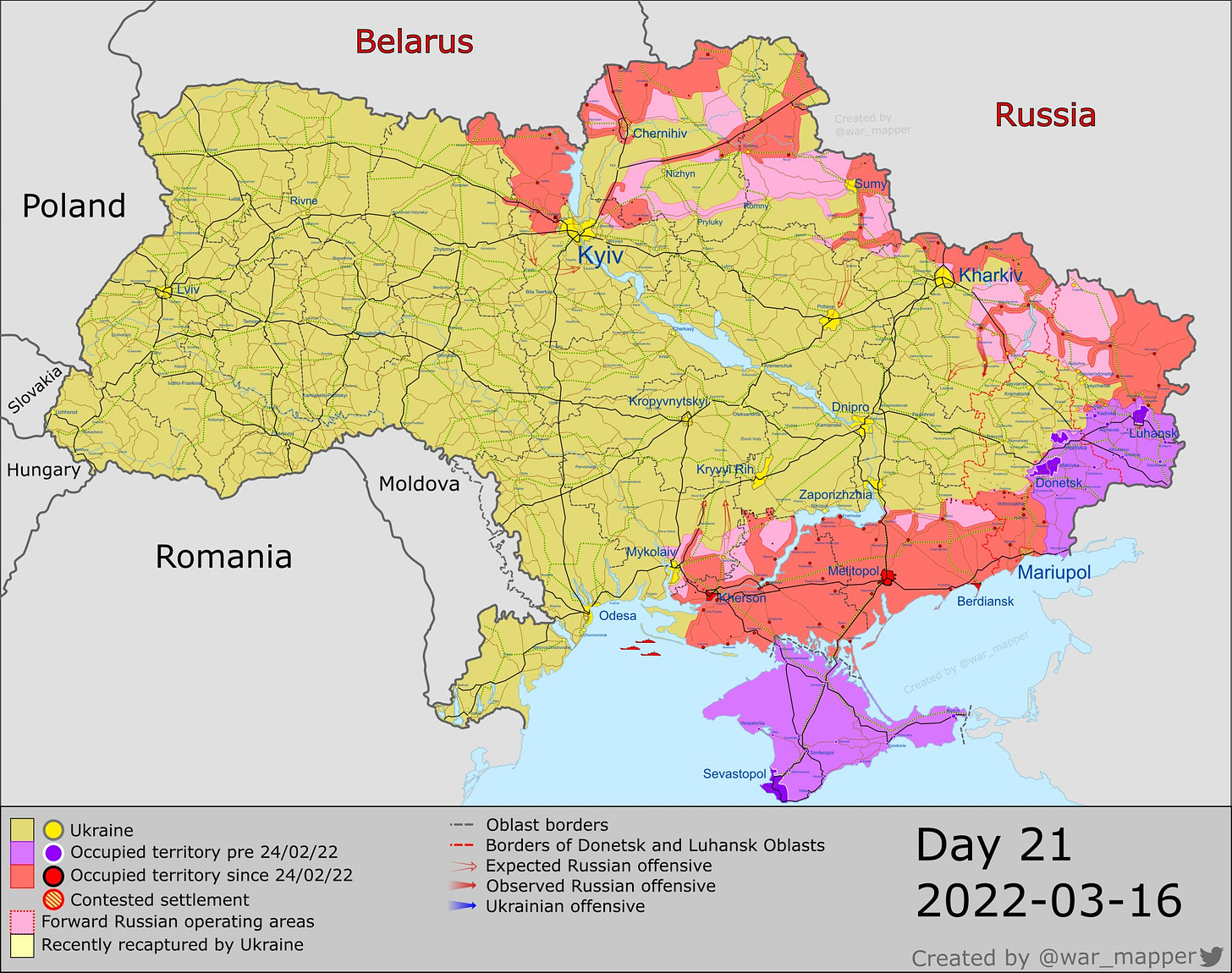
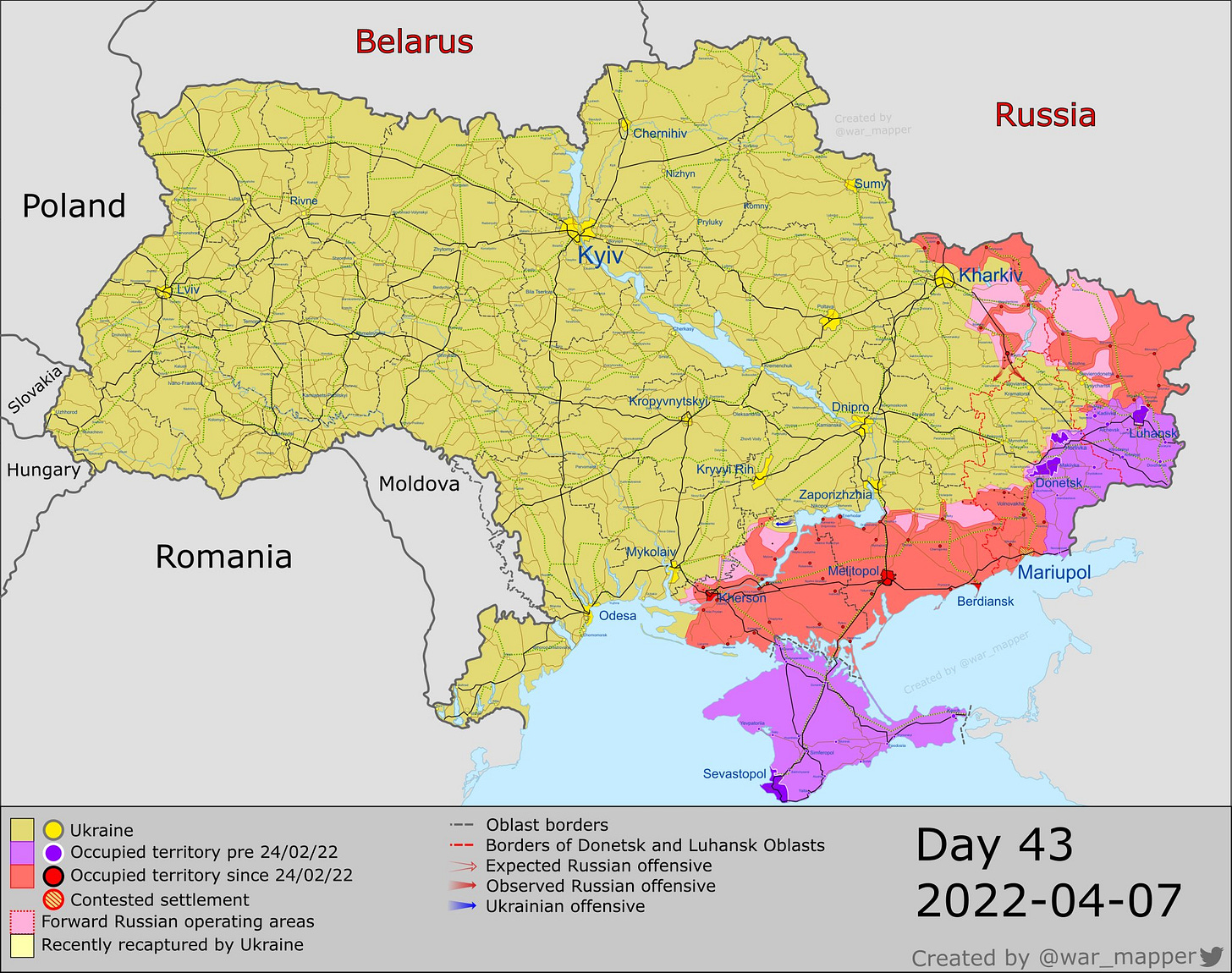
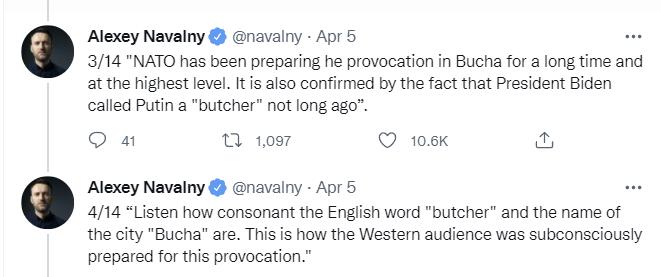




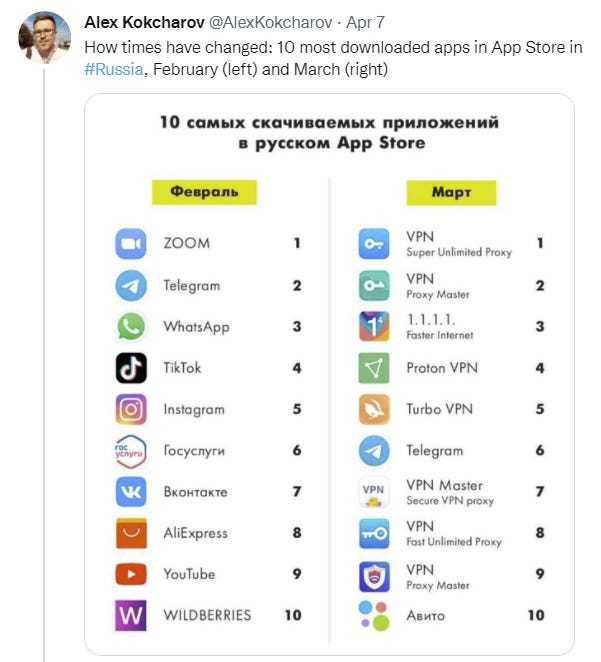



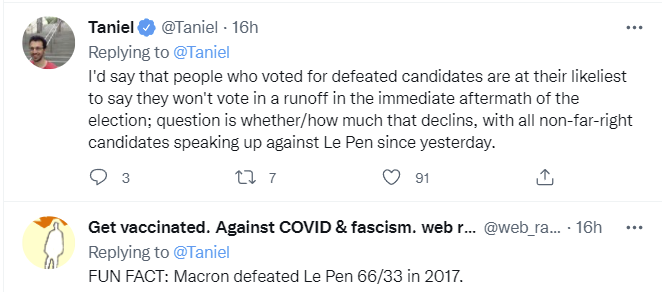


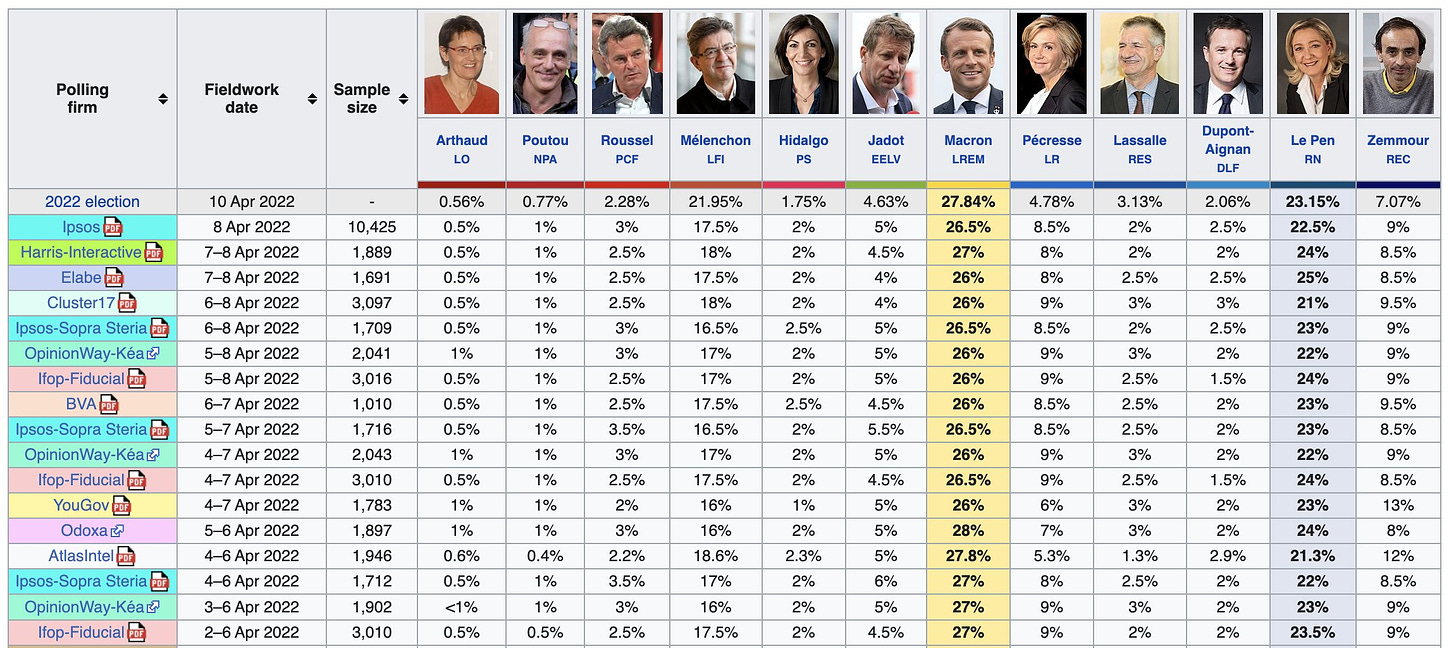

I think the consensus views you cite underestimate Russia's capacity and commitment to continue destruction.
I'd like to see US policy encourage any peace deal that is acceptable to both Ukraine and Russia. I don't see evidence of that. It seems as if the administration wants a peace that is a clear defeat for Russia.
In other words, I think our terms are tougher than Ukraine's terms. And that seems wrong.
I don't know what a "super" EMP is but 30 years ago when I was in satellite communications in the army all of our equipment was "regular" EMP hardened. It's got to be better now. That super-EMP thread sounds like a good story for a novel though.